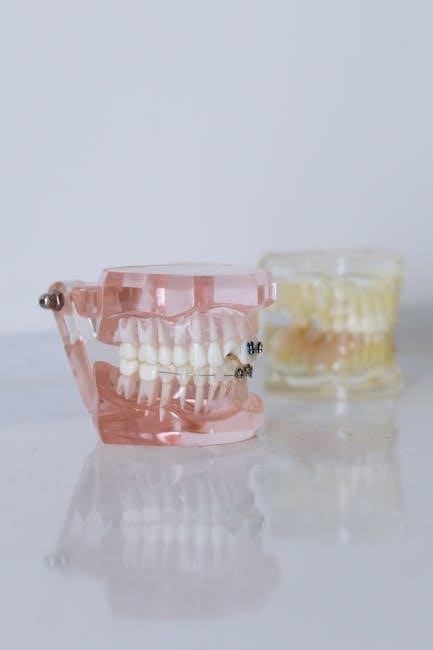Proper denture care is essential for maintaining oral hygiene, preventing bad breath, and ensuring the longevity of your dentures. Regular cleaning and maintenance can prevent infections and keep your dentures looking their best while promoting overall mouth health.
1.1 Importance of Denture Care
Proper denture care is crucial for maintaining oral hygiene, preventing infections, and ensuring the longevity of your dentures. Regular cleaning helps remove plaque and bacteria, which can cause bad breath and gum irritation. Without proper care, dentures may develop stains or odors, affecting their appearance and functionality. Additionally, poor denture hygiene can lead to oral infections and discomfort. Cleaning and maintaining dentures also supports the health of surrounding tissues and natural teeth, especially for partial denture wearers. By following a daily cleaning routine and storing dentures correctly, you can prevent damage and ensure they fit comfortably. Proper care also helps maintain the overall health of your mouth, preventing issues like sore spots or loose-fitting dentures. Regular maintenance ensures your dentures continue to function effectively, allowing you to eat, speak, and smile confidently. Proper denture care is an essential part of your daily routine for a healthy, comfortable smile.
1.2 Initial Sensations When Wearing Dentures
When first wearing dentures, it is common to experience a feeling of bulkiness or oddness in the mouth. This sensation is normal as your mouth adjusts to the new appliance. Some individuals may also notice increased saliva production or difficulty speaking clearly. These initial sensations typically subside as you become accustomed to wearing dentures. It is important to give yourself time to adapt, as the brain and muscles need to learn how to function with the dentures. Practicing speaking in front of a mirror or chewing slowly can help improve comfort and confidence. If the dentures feel loose or cause discomfort, consult your dentist for adjustments. Remember, patience is key during this adjustment period, as proper fitting and comfort are achievable with time and practice.
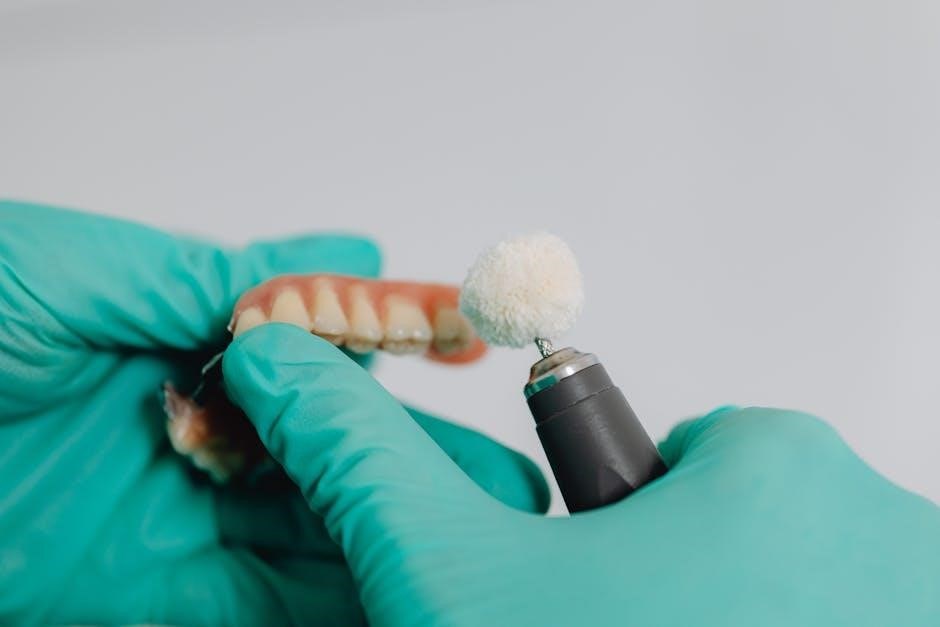
Handling and Safety
Handle dentures carefully to avoid bending or damaging the clasps or plastic. Always rinse dentures after meals and store them safely to prevent accidental damage or loss.
2.1 Proper Handling Techniques
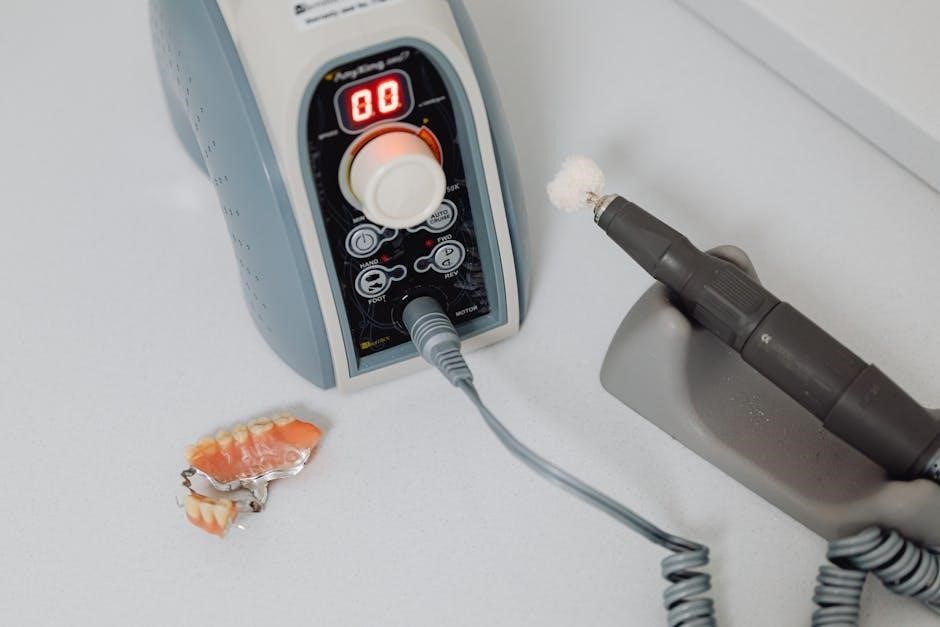
Properly handling your dentures ensures longevity and prevents damage. Always clean them over a sink filled with water or a soft towel to cushion potential drops. Use a soft-bristled denture brush or toothbrush to gently remove food particles and plaque. Avoid bending or forcing the clasps, as this can cause permanent damage. When cleaning, apply mild liquid soap or a denture-specific cleaner, avoiding abrasive toothpaste or harsh chemicals. Rinse thoroughly with warm water to remove all residue. Store dentures in a protective case when not in use to prevent accidental breakage or misplacement. By following these simple steps, you can maintain the integrity of your dentures and ensure they remain functional and comfortable for years to come.
2.2 Avoiding Damage to Dentures
To prevent damage, avoid exposing dentures to extreme temperatures, direct sunlight, or harsh chemicals. Never soak them in hot water, as this can warp the plastic. Avoid using abrasive cleaners or hard-bristled brushes, which can scratch the surface. When cleaning, always handle dentures over a soft cloth or basin filled with water to cushion any accidental drops. Keep dentures away from pets and children to prevent mishandling. Regularly inspect for cracks or wear and address any issues promptly. By storing them in a protective case soaked in cleaning solution overnight, you maintain their shape and cleanliness. Proper care ensures your dentures remain durable, fitting well and functioning optimally over time.
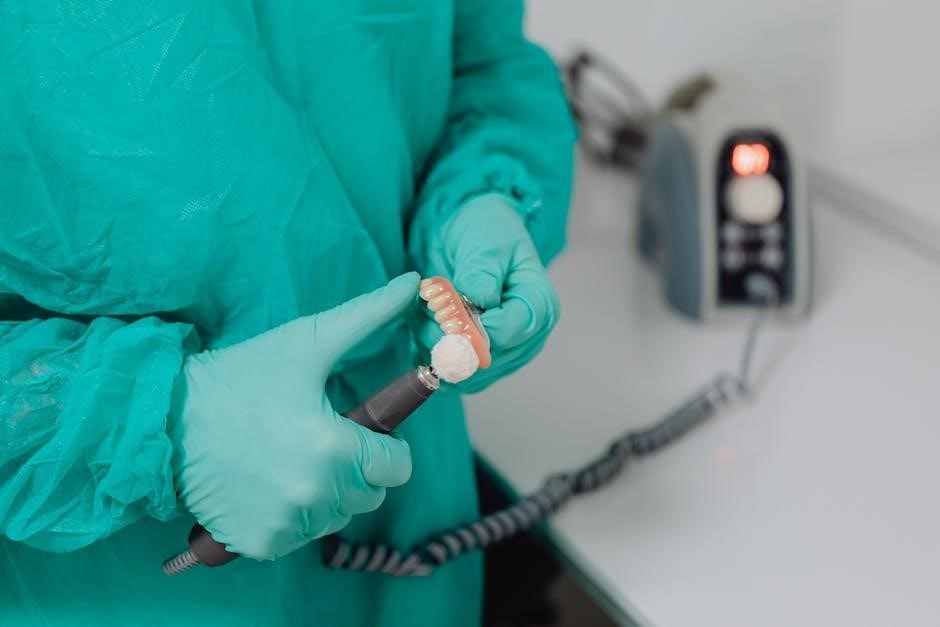
Daily Cleaning Routine
Brush your dentures daily with a soft-bristled toothbrush or denture brush using mild soap or denture cleaner. Rinse thoroughly after meals to remove food particles and maintain hygiene.
3.1 Brushing Your Dentures
Brushing your dentures is a crucial step in maintaining their cleanliness and preventing the buildup of plaque and stains. Use a soft-bristled toothbrush or a denture brush specifically designed for this purpose. Apply a small amount of mild liquid soap or a denture cleaner, as regular toothpaste can be too abrasive and may damage the denture material. Gently scrub all surfaces, including the tops, bottoms, and edges, ensuring no areas are missed. This helps remove food particles and keeps your dentures looking their best. Avoid using hot water, as it may warp the denture. Instead, rinse thoroughly with cool or warm water to ensure all residue is removed. Regular brushing helps maintain a fresh appearance and prevents bad breath.
3.2 Using Denture Cleaning Solutions
Using denture cleaning solutions is an effective way to remove plaque, bacteria, and stains from your dentures. Soak your dentures in a solution specifically designed for denture care, such as Efferdent or Polident, according to the manufacturer’s instructions. These solutions typically come in tablet, powder, or liquid form and work best when soaked for 15–30 minutes. Avoid using harsh chemicals, bleach, or hot water, as they can damage the denture material or discolor metal parts. After soaking, rinse your dentures thoroughly with cool or warm water to ensure all cleaning agents are removed. For added convenience, ultrasonic cleaners can also be used to deeply clean your dentures, but always follow the device’s guidelines. Regular use of these solutions helps maintain your dentures’ appearance and prevents the buildup of harmful bacteria.
3.3 Rinsing After Cleaning
Rinsing your dentures after cleaning is a crucial step to ensure all debris, bacteria, and cleaning agents are removed. Use cool or warm water, as hot water may warp or damage the denture material. After soaking or brushing, rinse thoroughly to eliminate any remaining plaque or cleaning solution residue. This step helps prevent bacterial growth and keeps your dentures hygienic. For partial dentures, rinsing also cleans around the metal clasps and natural teeth interfaces. Proper rinsing ensures a fresh, clean feel when reinserting your dentures and helps maintain oral hygiene. Always rinse gently to avoid dropping or bending your dentures. Regular and thorough rinsing is essential for the longevity and comfort of your dentures, ensuring they remain functional and aesthetically pleasing for years to come.
3.4 Recommended Cleaning Products
When cleaning your dentures, it’s important to use products specifically designed for denture care. Mild liquid soap or antibacterial hand soap can be effective for daily cleaning. Denture cleaning solutions, such as effervescent tablets or soaking solutions, are also recommended to remove plaque and stains. Avoid using toothpaste, as it can be too abrasive and damage the denture surface. For tough stains, consider using a soft-bristled denture brush with a gentle cleanser. Always follow the manufacturer’s instructions for any cleaning product. Soaking solutions can help loosen debris overnight, while ultrasonic cleaners provide a deep clean. Avoid harsh chemicals, bleach, or hot water, as they may harm the denture material. Using the right cleaning products ensures your dentures remain clean, hygienic, and in good condition for years to come.

Storage and Maintenance
Store dentures in cold water or a soaking solution overnight to maintain shape and hygiene. Avoid direct sunlight and heat, which can warp or damage the material.
4.1 Overnight Storage and Soaking
Proper overnight storage is crucial for maintaining denture hygiene and fit. Soak your dentures in cold water or a denture cleaning solution to remove plaque and stains. Avoid using hot water, as it can warp the denture material. Always follow the manufacturer’s instructions for soaking solutions to ensure effectiveness and safety. Storing dentures in a protective case can prevent accidental damage. If you have partial dentures, soaking helps maintain the shape and prevents bacterial growth. Regular overnight soaking also allows your gums to rest, promoting oral health. Remember to rinse your dentures thoroughly before reinserting them in the morning to ensure a clean and comfortable fit.
4.2 Tips for Traveling with Dentures
Traveling with dentures requires careful planning to ensure they remain clean, secure, and undamaged. Always carry a protective case to store your dentures when not in use, preventing accidental drops or bends. Pack a small cleaning kit with a soft-bristled brush, mild soap, and a denture cleaning solution. Avoid using hot water, as it can warp the denture material. When cleaning on the go, rinse your dentures thoroughly with cold water to remove food particles and plaque. Consider bringing a travel-sized denture cleaner for convenience. If flying, keep your dentures in your carry-on luggage to avoid loss or damage. For extended trips, include a spare set of denture adhesive strips in case of emergencies. By following these tips, you can maintain your denture care routine seamlessly while traveling.
4.3 Caring for Partial Dentures

Caring for partial dentures involves maintaining both the artificial and natural teeth. Daily cleaning is crucial to remove plaque and food particles, which can accumulate around the clasps and natural teeth. Use a soft-bristled toothbrush and fluoride toothpaste to clean natural teeth, and a denture brush or soft toothbrush for the artificial teeth. Avoid using abrasive products that could damage the denture material. Soak the partial denture in a cleaning solution as recommended by the manufacturer to help loosen stains and plaque. When handling partial dentures, do so gently to avoid bending or breaking the clasps. Regular dental check-ups are essential to ensure proper fit and to address any issues with surrounding teeth or gums. Proper care extends the lifespan of your partial dentures and supports overall oral health.

Advanced Care Tips
Use denture adhesives for extra stability and cleaning products specifically designed for dentures. Soak them daily to maintain hygiene and prevent stains. Regular adjustments ensure proper fit and comfort.

5.1 Using Denture Adhesives
Denture adhesives can enhance stability and confidence for wearers. Available as pastes, powders, or strips, they help secure dentures in place. Always follow product instructions for application. Apply a small amount to clean, dry dentures, spreading evenly across the tissue side. Avoid overuse, as excess adhesive can be difficult to remove. Adhesives are not a solution for poorly fitting dentures and should not be used on broken or damaged dentures. They are ideal for temporary adjustments or additional grip. After use, rinse your mouth thoroughly to remove any residue. Proper use of adhesives can improve chewing efficiency and reduce movement during speaking and eating. If discomfort or irritation occurs, discontinue use and consult a dentist. Regular cleaning and maintenance of dentures are still essential when using adhesives.
5.2 Adjusting to Dentures
Adjusting to dentures requires patience and practice. Initially, they may feel bulky or uncomfortable, but with time, your mouth adapts. Start with soft foods to ease into chewing and speaking. Practice enunciating by reading aloud or repeating phrases. Sore spots may develop; consult your dentist for adjustments to ensure a proper fit. Clean your gums and tongue daily with a soft brush to maintain oral health. Avoid using denture adhesives as a permanent solution for ill-fitting dentures. Instead, schedule regular check-ups for adjustments. The adjustment period varies, but most people adapt within a few weeks. Keep your dentures clean and follow proper care routines to ensure comfort and functionality. Remember, consistency and proper care are key to a smooth transition with your new dentures.
5.3 Cleaning Natural Teeth with Partial Dentures
Cleaning natural teeth with partial dentures requires careful attention to maintain oral hygiene and prevent complications. Brush your natural teeth twice daily with fluoride toothpaste and a soft-bristled toothbrush, paying special attention to areas around the partial denture. Gently clean the surfaces where the denture attaches to natural teeth to avoid irritation. Use floss or interdental brushes to remove plaque and food particles between natural teeth and the denture. Rinse your mouth with water or an antibacterial mouthwash to eliminate bacteria. Regularly cleaning your natural teeth helps prevent decay and gum disease. Additionally, clean your partial dentures daily by rinsing them with water and using a mild soap or denture cleaner. Schedule regular dental check-ups to ensure proper fit and health of both your natural teeth and dentures.
5.4 Eating and Speaking with Dentures
Eating and speaking with dentures may require some adjustment, but with practice, you can regain confidence. Start with soft foods like yogurt, mashed potatoes, and scrambled eggs to get used to chewing. Avoid hard or sticky foods, such as nuts or caramel, until you feel comfortable. Chew slowly and evenly on both sides to distribute the force. For speaking, practice difficult sounds in front of a mirror or with a friend. Dentures may feel bulky at first, but your mouth will adapt. Stay hydrated to keep your mouth moist, which helps with speaking. Regular dental check-ups ensure proper fit and function. Over time, eating and speaking with dentures will become second nature, allowing you to enjoy meals and conversations with ease.
5.5 Immediate Denture Care
Immediate denture care is crucial for ensuring comfort and proper adaptation. After receiving your dentures, rinse them with warm water to remove any loose particles. Clean them gently with a soft-bristled toothbrush or denture brush using mild soap or a recommended denture cleaner. Avoid using abrasive toothpaste, as it can scratch the surface. Soak your dentures overnight in a cleansing solution to maintain hygiene and prevent bacteria buildup. Always follow the manufacturer’s instructions for cleaning products. If you experience sore spots, contact your dentist for adjustments. Regular rinsing after meals helps prevent food debris accumulation. Proper immediate care ensures your dentures remain functional, comfortable, and clean, promoting a healthy oral environment.
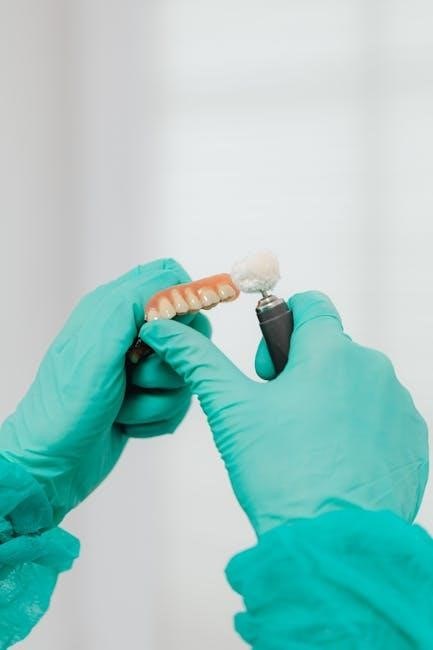
Common Issues and Solutions
Common issues with dentures include sore spots, stains, and loose fit. Solutions involve adjusting dentures, using cleaning solutions, and consulting a dentist for proper adjustments and maintenance.
6.1 Managing Sore Spots
Sore spots on the gums or mouth tissues can develop due to ill-fitting dentures or prolonged wear. To manage this, rinse your mouth with warm saltwater to reduce inflammation. Apply a healing paste or protective wax to the affected area. Avoid chewing forcefully and ensure proper denture fit. If discomfort persists, consult your dentist for adjustments. Regular cleaning and overnight storage can also prevent irritation. Sore spots often resolve with proper care and professional adjustment.
6.2 Removing Stains and Discoloration
Removing stains and discoloration from dentures is crucial for maintaining their appearance and hygiene. Use a soft-bristled toothbrush and mild soap or a denture cleaner to gently scrub away stains. Soaking dentures in a cleaning solution, such as Efferdent or Polident, can help lift tough stains. Avoid using bleach or harsh chemicals, as they may damage the denture material. For natural-looking dentures, try soaking them in equal parts water and white vinegar for 30 minutes. Always rinse thoroughly after cleaning to remove any residue. If stains persist, consult your dentist for professional cleaning or polishing. Regular maintenance can prevent discoloration and keep your dentures looking like new. Proper care ensures your dentures remain clean, functional, and aesthetically pleasing.
6.3 Dealing with Loose Dentures
Loose dentures can cause discomfort and affect chewing ability. If your dentures feel unstable, ensure proper cleaning and drying before reinserting them. Using a denture adhesive, as per the product instructions, can provide temporary stability. However, this is not a permanent solution. If the issue persists, consult your dentist for adjustments or relining to restore a proper fit. Avoid using excessive force, as this may damage the dentures. Regular check-ups are essential to address any changes in your mouth structure that may cause looseness. Proper maintenance and professional adjustments can prevent further complications and ensure your dentures remain secure and functional. Addressing loose dentures promptly helps maintain oral health and overall comfort.

Professional Denture Care
Regular dental check-ups ensure dentures fit properly and function well. Professionals can address issues like wear, stains, or damage, preventing complications and maintaining optimal oral health.
7.1 Importance of Regular Check-ups
Regular dental check-ups are crucial for ensuring the longevity and proper fit of your dentures. During these visits, your dentist will examine the dentures for signs of wear, such as cracks or thinning acrylic, and assess how well they align with your gums. Any necessary adjustments can be made to improve comfort and prevent issues like sore spots or uneven distribution of chewing forces. Additionally, your dentist will check the health of your gums, tongue, and remaining natural teeth (if applicable) to ensure there are no signs of infection or disease. Regular check-ups also provide an opportunity to address any concerns or discomfort you may be experiencing. By maintaining regular appointments, you can prevent minor issues from becoming major problems, ensuring your dentures continue to function effectively and contribute to your overall oral health.
7.2 When Professional Repairs Are Needed
Professional repairs are necessary when your dentures sustain noticeable damage, such as cracks, chips, or broken clasps. If you notice wear, misalignment, or a poor fit, consult your dentist promptly. Delaying repairs can lead to further damage or discomfort. Dentures that cause persistent sore spots or shift during speaking or eating may require adjustment. Additionally, if you accidentally drop your dentures or expose them to extreme heat, professional evaluation is recommended to ensure they remain functional. Your dentist can assess the extent of the damage and perform necessary repairs, such as reinforcing the structure or reallocating the fit. Regular check-ups can often prevent the need for major repairs by addressing minor issues early. Timely professional intervention ensures your dentures continue to provide optimal comfort and performance.
Proper denture care is essential for maintaining oral hygiene and ensuring longevity. Regular cleaning, storage, and professional check-ups prevent infections and ensure a comfortable fit.
8.1 Summary of Key Points
Proper denture care involves regular cleaning, safe handling, and consistent maintenance to ensure longevity and comfort. Daily routines include brushing with a soft-bristled brush, using denture-specific cleaners, and rinsing thoroughly. Storing dentures overnight in a cleaning solution or water helps maintain their shape and hygiene. Avoiding harsh chemicals, extreme temperatures, and bending or forcing dentures prevents damage. Professional check-ups are crucial for adjustments and ensuring proper fit. Additional tips like cleaning natural teeth with partial dentures and using adhesives as needed can enhance comfort and functionality. Following these guidelines helps prevent issues like stains, sore spots, and loose fit, ensuring a healthy and confident smile.
